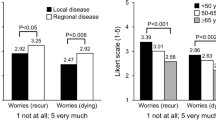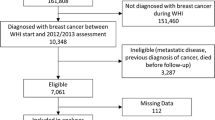Abstract
Younger women with breast cancer consistently show greater psychological distress than older women. This study examined a range of factors that might explain these age differences. A total of 653 women within 8 months of a first-time breast cancer diagnosis provided data on patient characteristics, symptoms, and psychosocial variables. Chart reviews provided cancer and treatment-related data. The primary outcome was depressive symptomatology assessed by the Beck Depression Inventory. A succession of models that built hierarchically upon each other was used to determine which variables could account for age group differences in depression. Model 1 contained age group only. Models 2–5 successively added patient characteristics, cancer-related variables, symptoms, and psychosocial variables. As expected, in the unadjusted analysis (Model 1) younger women were significantly more likely to report depressive symptomatology than older women (p < 0.0001). Age remained significantly related to depression until Model 4 which added bodily pain and vasomotor symptoms (p = 0.24; R 2 = 0.27). The addition of psychosocial variables in Model 5 also resulted in a model in which age was nonsignificant (p = 0.49; R 2 = 0.49). Secondary analyses showed that illness intrusiveness (the degree that illness intrudes on specific areas of life such as work, sex life, recreation, etc.) was the only variable which, considered individually with age, made the age group-depression association nonsignificant. Age differences in risk of depression following a breast cancer diagnosis can be explained by the impact of cancer and its treatment on specific areas of a woman’s life.
Similar content being viewed by others
References
ACS. American Cancer Society, Cancer Facts & Figures 2012. Atlanta, American Cancer Society
Ganz PA, Lee JJ, Sims MS, Polinsky ML, Schag CA (1992) Exploring the influence of multiple variables on relationship of age to quality of life in women with breast cancer. J Clin Epidemiol 45:473–485
Golden-Kreutz DM, Andersen BL (2004) Depressive symptoms after breast cancer surgery: relationships with global, cancer-related, and life event stress. Psycho-Oncology 13:211–220
Avis NE, Deimling GT (2008) Cancer survivorship and aging. Cancer 113:3519–3529
Bardwell WA, Natarajan L, Dimsdale JE et al (2006) Objective cancer-related variables are not associated with depressive symptoms in women treated for early-stage breast cancer. J Clin Oncol 24:2420–2427
Broeckel JA, Jacobsen PB, Balducci L, Horton J, Lyman GH (2000) Quality of life after adjuvant chemotherapy for breast cancer. Breast Cancer Res Treat 62:141–150
Mosher CE, Danoff-Burg S (2005) A review of age differences in psychological adjustment to breast cancer. J Psychosocial Oncol 23:101–114
Wenzel LB, Fairclough DL, Brady MJ et al (1999) Age-related differences in the quality of life of breast carcinoma patients after treatment. Cancer 86:1768–1774
Compas BE, Stoll MF, Thomsen AH, Oppedisano G, Epping-Jordan JE, Krag DN (1999) Adjustment to breast cancer: age-related differences in coping and emotional distress. Breast Cancer Res Treat 54:195–203
Kroenke CH, Rosner B, Chen WY, Kawachi I, Colditz GA, Holmes MD (2004) Functional impact of breast cancer by age at diagnosis. J Clin Oncol 22:1849–1856
Mor V, Malin M, Allen S (1994) Age differences in the psychosocial problems encountered by breast cancer patients. J Natl Cancer Inst Monogr 16:191–197
Vinokur AD, Threatt BA, Vinokur-Kaplan D, Satariano WA (1990) The process of recovery from breast cancer for younger and older patients. Changes during the first year. Cancer 65:1242–1254
van’t Spijker A, Trijsburg RW, Duivenvoorden HJ (1997) Psychological sequelae of cancer diagnosis: a meta-analytical review of 58 studies after 1980. Psychosom Med 59:280–293
DiMatteo MR, Lepper HS, Croghan TW (2000) Depression is a risk factor for noncompliance with medical treatment: meta-analysis of the effects of anxiety and depression on patient adherence. Arch Intern Med 160:2101–2107
Day R, Ganz PA, Costantino JP (2001) Tamoxifen and depression: more evidence from the National Surgical Adjuvant Breast and Bowel Project’s Breast Cancer Prevention (P-1) Randomized Study. J Natl Cancer Inst 93:1615–1623
Fann JR, Thomas-Rich AM, Katon WJ et al (2008) Major depression after breast cancer: a review of epidemiology and treatment. Gen Hosp Psychiatry 30:112–126
Bower JE (2008) Behavioral symptoms in patients with breast cancer and survivors. J Clin Oncol 26:768–777
Deshields T, Tibbs T, Fan MY, Taylor M (2006) Differences in patterns of depression after treatment for breast cancer. Psycho-Oncology 15:398–406
Burgess C, Cornelius V, Love S, Graham J, Richards M, Ramirez A (2005) Depression and anxiety in women with early breast cancer: five year observational cohort study. BMJ 330:702
Parker PA, Baile WF, de Moor C, Cohen L (2003) Psychosocial and demographic predictors of quality of life in a large sample of cancer patients. Psycho-Oncology 12:183–193
Howard-Anderson J, Ganz PA, Bower JE, Stanton AL (2012) Quality of life, fertility concerns, and behavioral health outcomes in younger breast cancer survivors: a systematic review. J Natl Cancer Inst 104:386–405
Anders CK, Fan C, Parker JS et al (2011) Breast carcinomas arising at a young age: unique biology or a surrogate for aggressive intrinsic subtypes? J Clin Oncol 29:e18–e20
Avis NE, Crawford S, Manuel J (2004) Psychosocial problems among younger women with breast cancer. Psycho-Oncology 13:295–308
Wong-Kim EC, Bloom JR (2005) Depression experienced by young women newly diagnosed with breast cancer. Psycho-Oncology 14:564–573
Beck AT, Steer RA, Ball R, Ranieri W (1996) Comparison of Beck Depression Inventories-IA and -II in psychiatric outpatients. J Pers Assess 67:588–597
Beck AT, Steer RA (1987) Beck depression inventory manual. The Psychological Corporation, San Antonio, Texas
Rowland JH (1989) Developmental stage and adaptation: adult model. In: Holland JD, Rowalnd JH (eds) Handbook of psychoonocology. Oxford University Press, Oxford, pp 25–43
Pal SK, Childs BH, Pegram M (2010) Emergence of nonanthracycline regimens in the adjuvant treatment of breast cancer. Breast Cancer Res Treat 119:25–32
Lyman GH, Dale DC, Crawford J (2003) Incidence and predictors of low dose-intensity in adjuvant breast cancer chemotherapy: a nationwide study of community practices. J Clin Oncol 21:4524–4531
Barnabei VM, Cochrane BB, Aragaki AK et al (2005) Menopausal symptoms and treatment-related effects of estrogen and progestin in the Women’s Health Initiative. Obstet Gynecol 105:1063–1073
Devins GM (2010) Using the illness intrusiveness ratings scale to understand health-related quality of life in chronic disease. J Psychosom Res 68:591–602
Peterman AH, Fitchett G, Brady MJ, Hernandez L, Cella D (2002) Measuring spiritual well-being in people with cancer: the functional assessment of chronic illness therapy–Spiritual Well-being Scale (FACIT-Sp). Ann Behav Med 24:49–58
Canada AL, Murphy PE, Fitchett G, Peterman AH, Schover LR (2008) A 3-factor model for the FACIT-Sp. Psycho-Oncology 17:908–916
Carver CS (1997) You want to measure coping but your protocol’s too long: consider the brief COPE. Int J Behav Med 4:92–100
Lasry JC, Margolese RG, Poisson R et al (1987) Depression and body image following mastectomy and lumpectomy. J Chronic Dis 40:529–534
Sherbourne CD, Stewart AL (1991) The MOS social support survey. Soc Sci Med 32:705–714
Scheier MF, Carver CS (1985) Optimism, coping, and health: assessment and implications of generalized outcome expectancies. Health Psychol 4:219–247
Nagelkerke JD (1991) A note on a general definition of the coefficient of determination. Biometrika 78:691–692
Bloom JR, Stewart SL, Johnston M, Banks P (1998) Intrusiveness of illness and quality of life in young women with breast cancer. Psycho-Oncology 7:89–100
Dunn LB, Cooper BA, Neuhaus J et al (2011) Identification of distinct depressive symptom trajectories in women following surgery for breast cancer. Health Psychol 30(6):683–692
Burwell SR, Case LD, Kaelin C, Avis NE (2006) Sexual problems in younger women after breast cancer surgery. J Clin Oncol 24:2815–2821
Ganz PA, Rowland JH, Desmond K, Meyerowitz BE, Wyatt GE (1998) Life after breast cancer: understanding women’s health-related quality of life and sexual functioning. J Clin Oncol 16:501–514
Acknowledgments
The authors thank the funding provided by the Department of Defense Grant #DAMD 17-01-0447.
Conflict of interest
The authors declare that there are no conflicts of interest.
Author information
Authors and Affiliations
Corresponding author
Rights and permissions
About this article
Cite this article
Avis, N.E., Levine, B., Naughton, M.J. et al. Explaining age-related differences in depression following breast cancer diagnosis and treatment. Breast Cancer Res Treat 136, 581–591 (2012). https://doi.org/10.1007/s10549-012-2277-0
Received:
Accepted:
Published:
Issue Date:
DOI: https://doi.org/10.1007/s10549-012-2277-0




